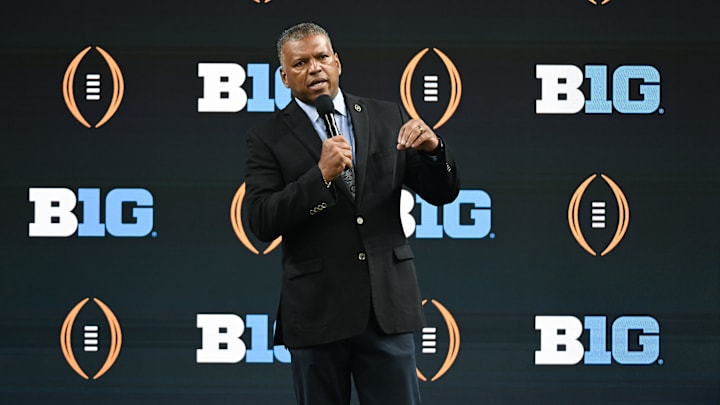College football is so close fans can almost taste the feeling of tailgates and touchdowns. This season there are a lot of changes to the world of college football. There are six new rules being implemented this season, teams are moving to new conferences, and the biggest change of all is the College Football Playoff expanding to 12 teams.
Since the College Football Playoff became official back in 2014, there have only been four teams competing in the playoff. The expansions obviously mean more teams get a chance at the ultimate goal, a National Championship.
However, with an expansion comes new rules and guidelines for the playoffs. So here is everything you need to know about the 12-team CFP expansion ahead of the 2024-2025 season.
Who qualifies and how will seeding work?
The College Football Playoff Committee announced earlier this year that they are implementing a 5-7 format for the new 12-team playoff. What the 5-7 format means is that five conference champions will be guaranteed a spot in the played and the next seven highest-tanked teams will earn the final spots.
The SEC, Big 12, Big Ten, and ACC champions will get auto bids and the fifth conference champion spot will go to the highest-ranked Group of Five champion. A conference champion is a conference champion, so if Iowa were to be ranked 18th but end up winning the Big Ten, they would get an automatic spot in the playoff, they just might be seeded lower in those top five seeds.
The four highest-ranked conference champions will receive the top four seeds and receive a first-round bye. The remaining eight teams will play in first-round matchups with the higher seeds hosting the lower seeds on their home field. Rematches will not be avoided, even if teams from the same conference match up against each other.
Bracket play
First round (home games)
Friday, December 10, and Saturday, December 21
- No. 12 seed at No. 5 seed
- No. 9 seed at No. 8 seed
- No. 11 seed at No. 6 seed
- No. 10 seed at No. 7 seed
Quarterfinals
Tuesday, December 31, and Wednesday, January 1, 2025
- No. 4 seed plays the winner of No. 12 vs. No. 5
- No. 1 seed plays the winner of No. 9 vs. No. 8
- No. 3 seed plays the winner of No. 11 vs. No. 6
- No. 2 seed plays the winner of No. 10 vs. No. 7
Semifinals
Thursday, January 9, 2025: Captial One Orange Bowl
Friday, January 10, 2025: Goodyear Cotton Bowl Classic
CFP National Championship
Monday, January 20, 2025: Mercedes-Benz Stadium, Atlanta
Who is on the selection committee?
- Michigan athletic director Warde Manuel (committee chair)
- Former Nevada coach Chris Ault
- Navy athletic director Chet Gladchuk
- Former Wake Forest coach Jim Grobe
- Miami (Ohio) athletic director David Saylor
- Former sportswriter Kelly Whiteside
- Former All-American Nebraska lineman Will Shields
- Former Toledo and Missouri coach Gary Pinkel
- Baylor athletic director Mack Rhoades
- Virginia athletic director Hunter Yurachek
- Former Oregon State and Nebraska coach Mike Riley
- Former Arizona State All-American guard Randall McDaniel
The College Football Playoff committee is looking at each team's strength of schedule, head-to-head competition, championships won, comparative outcome of common opponents, and other relevant factors.
